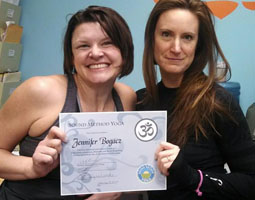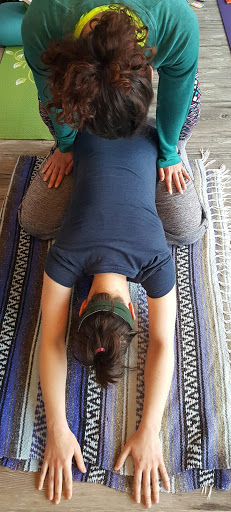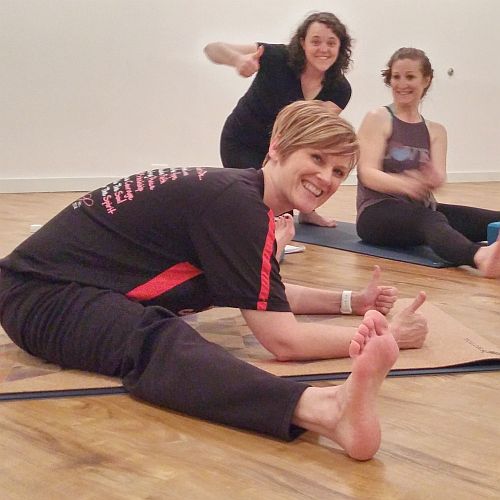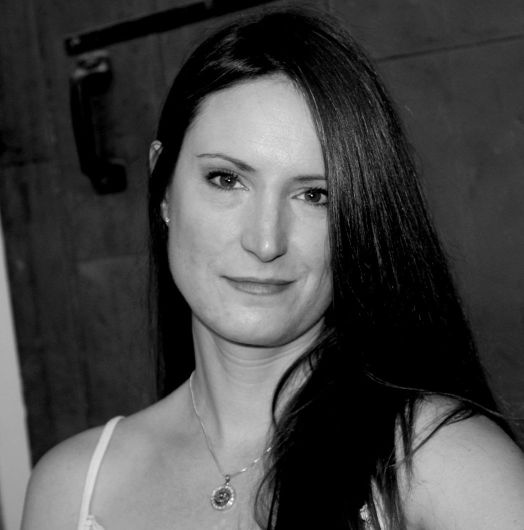Yoga Teacher Training is a dream for many. For a dedicated student of Yoga it represents a commitment to practice but also to a balanced lifestyle and a potential vocation. I’ve found over the years that the process of training can be life altering. It is a time that we are affirmed in warm and trusting relationships with our fellow trainees and teachers, but also humbled by new ideas and experiences. As a Director and Lead Instructor of Teacher Training at Sound Method since 2012 I have watched and participated in this experience many times. Of course, I’ve also been on the other side of the process and I look back on the experience with great fondness. YTT is about so much more than learning how to teach yoga. It’s about discovering yourself through the lens of so many centuries of Yoga history and philosophy. It’s transforming the way your view yourself and interact with others. Yoga Teacher Training is an opportunity to discover THE body, through the lens of YOUR body; its anatomy and tendencies, strengths and weaknesses.
Yoga teacher training is about so much more than just learning how to teach yoga. It’s about discovering yourself through the lens of so many centuries of Yoga history and philosophy. It’s transforming the way your view yourself and interact with others.
Most of the yoga teachers I know look back on their training as a wonderful experience. They admire their teachers and have made a place in their heart for their fellow trainees. Finding the right training for you though, is key. It’s hard to distinguish a program that is right for you, and one that isn’t when you are just starting out. You may be tempted to believe that all trainings are basically the same, that they all will include the same curriculum. This could not be further from the truth. The Yoga Alliance provides guidelines for teacher education, but they are vague to accommodate school’s individual philosophies and priorities. There are many MANY things to consider when enrolling in a YTT. I’ve put together a short list to help you narrow down options and find the perfect teacher training/yoga certification for you.
1. Am I ready?

This is the question I get from nearly every student considering yoga teacher training. I look for a few things in a future teacher. Certainly I like to see that a student has been dedicated to their practice for some time. At least 9 months is desirable. Though, If you have a background in movement, education, mind body disciplines or fitness you may be able to bridge the experience gap.
I like to see that you have a love of the practice and that you are willing to make choices in your life to accommodate it.
Perhaps a more telling sign of readiness is that you are getting on your mat at home if you can’t get to a class, you are curious about sequencing postures and excited about elements of class that usually go unnoticed. Readiness has nothing to do with your personal practice. You can be an amazing teacher and not know how to do a headstand, or be hopelessly confounded by the mechanics of arm balances. I would ask you to consider your own favorite yoga teacher; can they rock a handstand in the middle of the room? Can they touch the soles of their feet to the back of their head? Don’t know? Don’t care? That’s what I thought. Those things are not nearly as important as committing to the time and effort of simple and consistent practice.
If you are on the lower end of the experience spectrum look for a yoga teacher training that is extended. Programs that take place over 6-12 months will give you plenty of time to learn the details and mechanics of poses. If you are quite experienced already you would do well in an intensive or a traditional program.
2. Who are the primary faculty of the yoga teacher training?
If you have an opportunity to practice with the faculty of the training you are considering you should take it, as often as possible. These teachers will shape how you think about yoga and how you teach yoga. They will have a massive influence on how you grow in your own understanding of the practice. Look for teachers that are embodying the aspects of yoga that you value. This will require some self reflection and a fair amount of experience encountering what you DON’T want.
If you love the fitness side of yoga, look for training that minimizes philosophy. If you are drawn to the spiritual parts of practice you may want to avoid schools and teachers that seem preoccupied with their trendy yoga apparel.
Some teachers emphasize Ayurveda, some highlight alignment or anatomy. Many schools are non-dogmatic but some are very strict about respecting a specific lineage. If independance and self expression are a must for you, plan to avoid schools that insist on a strong continuation of lineage. If you value predictability and will feel more comfortable with a set structure for practice and teaching consider a training that prioritizes a “prescribed” practice such as Bikram, Anahata Yoga or Ashtanga.
Taking some time to look at the online curriculum is important. The Yoga Alliance requires that each training contains certain broad elements but much is left to interpretation by the specific school. Compare closely the curriculum of the schools you are considering to determine which one resonates with you the most. If you can practice in person with the teachers you are considering DO IT. If you can only access their classes online, that will do. Another great way to get know the faculty is read their blog and other publications. If the school does not require an interview, request a time to talk in person or over the phone. Even if you prefer the anonymity of large training. Even if you are a person that prefers to sit back and observe rather than call attention to yourself. I encourage you to reach out to faculty. this is a big investment of time and money. When you become a teacher yourself you will be representing this teacher and their school. It’s perfectly valid to request some time to get to know them before you register.

If you are able to practice with the faculty know that taking several classes is vital. No teacher wants to be defined by one class. Observe how the teacher(s) interact with students, in class AND out of class. You will be spending a great deal of time with this teacher and your experience will be better if you like and respect them.
3. What is the community like?

Almost as important as the faculty are your future classmates. One of the most rewarding aspects of leading Teacher Trainings is watching my students build relationships with each other. You won’t be besties with all of your colleagues but I predict that you will always have a place in your heart for them, not matter where life takes you. It’s delightful to watch these friendships begin and evolve through training and then long after graduation. The relationships you build in YTT are a vital part of your experience.
Visit the studio that hosts your prospective training if possible. If it’s a good fit, become a part of their community before training begins. Your experience will be so much deeper if you are not a stranger to the staff and to the space. If you are attending a training in another city or country even, this won’t be possible. Plan, in that case, to fully participate in every activity and offering. You won’t regret it. Practice with alumni of the training that you are considering. This will be easy if you are at a local studio since their staff may be largely composed of alum. Get to know the people that practice at the school. It’s great to be exposed to new types of people with different life experiences, but if you are a 50-something professional, going through this experience with a group of college students or visa versa the training won’t be as fulfilling for you.
As you are researching yoga teacher training, try to get a feel for what your hireability will be once you are a registered teacher. Will you be able to audition at the studio you trained at? Will you be prohibited from auditioning at other studios? What is the School’s reputation like in the yoga community?
Final thoughts
Yoga Teacher Training for me was a life changer. It dramatically altered the course of my life. It led me to the occupation and career that I had been preparing for my whole life, I just didn’t know it at the time. It was just the beginning of my commitment to the practice and the tiniest baby step to becoming the teacher I am today. Since then I have taught many thousands of classes, practiced almost daily and still spend a large portion of my free time studying and reading about yoga. Though I have grown immensely since graduating from training, I recognize that my roots are with that place, those classmates and teachers. It is for all of these reasons that I advise you to fully research your options for training.
It may be helpful to take some time to really consider why? “Why do I want to take a teacher training?” The answer may seem obvious, “I want to teach yoga” or “I want to learn more about yoga” But I would encourage you to dig in a few more layers. Taking the time to discover these motivations now will make you a better teacher and/or a better student in the long term.
ABOUT THE AUTHOR

Mandy Ryle
Mandy is the owner and founder of Sound Method. She’s been practicing yoga almost daily since 2006. A lover of literature and history, exercise and summer. Her most impressive skill is her ability to remember people and names, though at her 15 year high school reunion she remembered no one… A former professional musician, she’s never held a “real” job. She’s also a mom of 2 and step-mom of 1

2 Responses
It has been simply incredibly generous with you to provide openly what exactly many individuals would’ve marketed for an eBook to end up making some cash for their end, primarily given that you could have tried it in the event you wanted.
Thanks Giselle 🙂